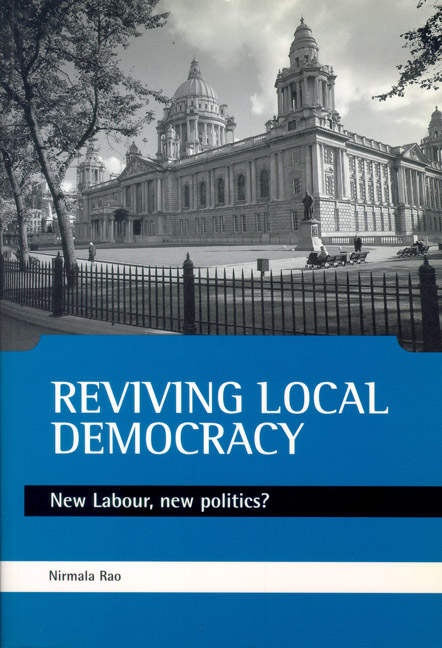Book contents
- Frontmatter
- Contents
- List of tables
- Acknowledgements
- one New times for local democracy
- two Local democracy and after
- three The failed promise of reform
- four Civic-minded Britain?
- five The reluctant voter
- six The third way and democratic reform
- seven The modernising agenda: enhancing participation
- eight The modernising agenda: new forms of political leadership
- nine Prospects for a new politics
- Bibliography
- Appendix A The surveys
- Appendix B The legislation
- Index
seven - The modernising agenda: enhancing participation
Published online by Cambridge University Press: 05 July 2022
- Frontmatter
- Contents
- List of tables
- Acknowledgements
- one New times for local democracy
- two Local democracy and after
- three The failed promise of reform
- four Civic-minded Britain?
- five The reluctant voter
- six The third way and democratic reform
- seven The modernising agenda: enhancing participation
- eight The modernising agenda: new forms of political leadership
- nine Prospects for a new politics
- Bibliography
- Appendix A The surveys
- Appendix B The legislation
- Index
Summary
The origins of the Labour government's revitalisation programme can be traced back to the party's third successive election defeat in 1987. A policy review process was set in motion in an attempt to break with past commitments and images that were thought to have contributed to Labour's unelectability. Two years later, Meet the challenge, make the change (Labour Party, 1989) was published – a precursor of the wave of modernisation documents that would follow within a few years. The intensification of central government control over local councils during Mrs Thatcher's third term leant an air of desperation to Labour thinking. Time, it seemed, was running out and the 1992 general election manifesto committed the party to “radical constitutional reform”.
Despite the pain of the unexpected defeat at that election, the constitutional reform bandwagon continued to roll and, under John Smith's leadership, took a revivalist approach to democratic politics. A working group under Tony Blair produced a comprehensive programme, entitled A new agenda for democracy and, when in 1994 Blair took over the leadership after Smith's untimely death, the future Labour government's commitment to reform could no longer be in doubt. Nor could the implications of democratic renewal for local government itself. As the 1995 publication Renewing democracy, rebuilding communities had put it:
Local councils exist to serve and speak up for local people. They can only do that properly if they keep in touch with local people and local organisations. Democratic elections are the bedrock on which the whole system is built…. But the ballot box is only part of the story. It is therefore imperative that councils keep in touch with local views between elections. (Labour Party, 1995, p 13)
This was not something that could be left to chance. Control or influence over many local services had passed from locally elected representatives to appointed bodies. As the influence of locally elected representatives diminished, “more resources have been wasted and many of these services have got worse, more expensive and less in touch with local needs” (Labour Party, 1995, p 3). The reforms envisaged are “intended to restore civic pride and renew the very idea of public service. They will contribute to the much-needed renewal of the democratic fabric of our society” (Labour Party, 1995, p 5).
- Type
- Chapter
- Information
- Reviving Local DemocracyNew Labour, New Politics?, pp. 133 - 162Publisher: Bristol University PressPrint publication year: 2000



